by Brooks Riley

by Brooks Riley

by Ashutosh Jogalekar
 The traveler comes to a divide. In front of him lies a forest. Behind him lies a deep ravine. He is sure about what he has seen but he isn’t sure what lies ahead. The mostly barren shreds of expectations or the glorious trappings of lands unknown, both are up for grabs in the great casino of life.
The traveler comes to a divide. In front of him lies a forest. Behind him lies a deep ravine. He is sure about what he has seen but he isn’t sure what lies ahead. The mostly barren shreds of expectations or the glorious trappings of lands unknown, both are up for grabs in the great casino of life.
First came the numbers, then the symbols encoding the symbols, then symbols encoding the symbols. A festive smattering of metamaniacal creations from the thicket of conjectures populating the hive mind of creative consciousness. Even Kurt Gödel could not grasp the final import of the generations of ideas his self-consuming monster creation would spawn in the future. It would plough a deep, indestructible furrow through biology and computation. Before and after that it would lay men’s ambitions of conquering knowledge to final rest, like a giant thorn that splits open dreams along their wide central artery.
Code. Growing mountains of self-replicating code. Scattered like gems in the weird and wonderful passage of spacetime, stupefying itself with its endless bifurcations. Engrossed in their celebratory outbursts of draconian superiority, humans hardly noticed it. Bits and bytes wending and winding their way through increasingly Byzantine corridors of power, promise and pleasure. Riding on the backs of great expectations, bellowing their heart out without pondering the implications. What do they expect when they are confronted, finally, with the picture-perfect contours of their creations, when the stagehands have finally taken care of the props and the game is finally on? Shantih, shantih, shantih, I say. Read more »
by Adele A Wilby
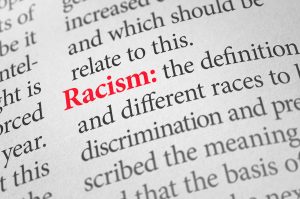 Although we know bias and racism exists in most societies, when put into coherent terms in the form of research the impact is stark and exposes just how much a part of life racism is for so many people. Booth and Mohdin’s (The Guardian 2018) article ‘Revealed: the stark evidence of everyday bias in Britain’ setting out the findings of a poll on the levels of negative experience, more often associated with racism, by Black, Asian and minority and ethnic groups in the United Kingdom(UK) does just that. Thus, for example, from amongst its many findings the survey revealed that 43% of those from a minority background had been overlooked for work promotion in the last five years in comparison with only 18% of white people who reported the same experience. Likewise, 38% of people from ethnic minorities said they had been wrongly suspected of shop lifting in the last five years, in comparison with 14% of white people. Significantly, 53% of people from a minority background believed they had been treated differently because of their hair, clothes and appearance, in comparison with 29% of white people. In the work-place also 57% of minorities said they felt they had to work harder to succeed in Britain because of their ethnicity, and 40% said they earned less.
Although we know bias and racism exists in most societies, when put into coherent terms in the form of research the impact is stark and exposes just how much a part of life racism is for so many people. Booth and Mohdin’s (The Guardian 2018) article ‘Revealed: the stark evidence of everyday bias in Britain’ setting out the findings of a poll on the levels of negative experience, more often associated with racism, by Black, Asian and minority and ethnic groups in the United Kingdom(UK) does just that. Thus, for example, from amongst its many findings the survey revealed that 43% of those from a minority background had been overlooked for work promotion in the last five years in comparison with only 18% of white people who reported the same experience. Likewise, 38% of people from ethnic minorities said they had been wrongly suspected of shop lifting in the last five years, in comparison with 14% of white people. Significantly, 53% of people from a minority background believed they had been treated differently because of their hair, clothes and appearance, in comparison with 29% of white people. In the work-place also 57% of minorities said they felt they had to work harder to succeed in Britain because of their ethnicity, and 40% said they earned less.
That racism, and indeed anti-Semitism, should be relegated to the dustbin of history is an aspiration shared by many. Of course, it is doubtful that there has ever been a society where racism has not been present. Nevertheless, that is not an excuse for it to become an acceptable phenomenon; it is a scourge on humanity, and has been the source of barbarity and brutality, cruelty and humiliation amongst fellow human beings. Its perpetual presence also serves to remind us of just how little we have learned from its devastating and harmful impact on peoples and societies throughout history. Thus, the recent research and reports of racism in the UK evoked reflection, and reminded me of my personal experience of racism in the United Kingdom, and how I realised the full weight of the phenomenon after the death of my husband. Read more »
THE VALE OF SAINTS
I drove up the Himalayan foothills
to Baba’s shrine
with my friend Masood
in a tired white Gypsy
with dodgy brakes,
urged on by my 94-year-old
mother at Hebrew Home
The Bronx
who said her father,
a wealthy ring-shawl merchant
patronized by the Maharajah,
had married three times
hoping to produce an heir,
but his wives proved barren.
Perhaps it was him,
Mother said.
Yet, he rode his Tonga
to the foothills, then trekked
to the thatched-roof shrine
where he tied a thread
to carved wooden roses,
prayed for a son.
Faith in Sufi mysticism
defined Islam in Kashmir,
commanding awe & respect
never shock & suspicion. Read more »
by Gabrielle C. Durham
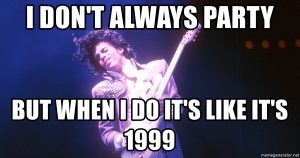 In the immortal words of Prince Rogers Nelson’s party gem from 1982:
In the immortal words of Prince Rogers Nelson’s party gem from 1982:
“But life is just a party, and parties weren’t meant to last . . .
“So tonight I’m gonna party like it’s 1999.”
So much fun stuff happened in 1999: rampant concern about Y2K; the movie “The Matrix” came out; Bill Clinton’s ongoing inability to keep his dick in his pants and subsequent impeachment and acquittal; former pro wrestler Jesse Ventura became governor of Minnesota; U.S. military college The Citadel graduated its first female cadet; the Elian Gonzalez controversy raged in the States; and Cher’s single “Believe” was released.
But do you remember what you said? Do you remember when something made you laugh, not LOL? It was not actually all that long ago, TBH. Back in 1999, reading a text typically meant applying a highlighter, most likely in neon yellow, to the testable information in a book or handout that the teacher assigned. It has a very different meaning from today’s pithier text message. In a score of years, English has changed. Duh, language is always changing; that’s how it stays alive. But if we think about it at all, we think of language change as being in evolutionary terms – something that takes generations, but it actually happens much more quickly. Read more »
by Joshua Wilbur
“How we spend our days is, of course, how we spend our lives.” —Annie Dillard

According to a July 2018 report from Nielsen, American adults now spend more than 11 hours a day on average consuming some form of media. The study considered time spent on television, radio, apps on smartphones, apps on tablets, internet on a computer, game consoles, and other devices. The study excluded print formats, such as books, magazines, and newspapers.
Eleven hours per day is a lot of time. Even if we add print formats to the mix—with the implicit judgement that “book hours” are superior to those dedicated to Netflix or Instagram—the fact remains that the majority of our waking lives is spent in engagement with the creations of other people. More than ever before, we are socially-hungry, story-obsessed, entertainment-seeking creatures.
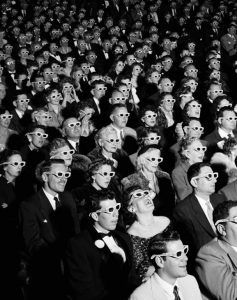
It’s easy enough to decry this state of affairs. Postmodernists on the Left have long cast a critical glance at consumer culture, commodity fetishism, and the struggle between greedy hoarders of capital and passive wage-earners, who, like the singing Prole woman in Orwell’s 1984, are free to amuse themselves to death. In the 1960s, Guy Debord characterized the modern West as a “Society of the Spectacle” in a book of the same name. According to Debord, “All that was once directly lived has become mere representation.” We prefer action shows to real adventure, rom-coms to actual romance, hi-def images to genuine experiences. Will Self, who just months ago wrote an essay called “The Printed Word in Peril” for Harper’s Magazine, described his impressions of Debord’s treatise in a 2013 article for the Guardian: “Rereading The Society of the Spectacle, I was struck yet again […] by Debord’s astonishing prescience – for what other text from the late 1960s so accurately describes the shit we’re still in?”
And yet, for all the well-placed critique, I can’t help but feel that Debord’s picture of people as ideology-drugged spectators reflects our reality in the worst possible light and, in any case, bemoaning it doesn’t get one very far. Read more »

View from my 12th floor hotel room in rainy London in September, 2017.
by Carol A Westbrook
On the first day of creation, God said. “Let there be light,” according to the Bible. In most major religions, God creates day and night, the sun, or light itself on the first day. To the ancients, the sun was God Himself–the Egyptians had Ra, and the Aztecs, Huītzilōpōchtli.There is something divine about light. Even a non-religious person feels a sense of something special when in bright sunlight.
first day. To the ancients, the sun was God Himself–the Egyptians had Ra, and the Aztecs, Huītzilōpōchtli.There is something divine about light. Even a non-religious person feels a sense of something special when in bright sunlight.
Sunlight! We crave it. We open the drapes, we spend time in the sun, we gaze at the sunset, we build stone  monuments to track it. In the dark days of winter we brighten our homes with candles and holiday lights. Winter religious holidays like Christmas and Chanukah emphasize lights and candles to brighten the darkness, while other holidays come during spring, when the days get longer. Many of us feel the need to travel south in
monuments to track it. In the dark days of winter we brighten our homes with candles and holiday lights. Winter religious holidays like Christmas and Chanukah emphasize lights and candles to brighten the darkness, while other holidays come during spring, when the days get longer. Many of us feel the need to travel south in  the dead of winter, to get a few days of bright light and longer days.
the dead of winter, to get a few days of bright light and longer days.
We don’t need to invoke religion to explain our craving for light, we can look to biology. Light–specifically daylight–is a human need, almost as critical as food, air and water. We need the periodicity of daylight to control our bodily processes, in particular those which occur in a diurnal cycle, such as sleeping, waking, meals, drowsy times, body temperature variations, and fertility.
Hormones control this periodicity. These include cortisol, which controls blood sugar and metabolism, and melatonin, a sleep regulator. Read more »
by Christopher Bacas
 “Eets beeg place. Millennium Theater. Brighton Beach. You see it. We start seven. Very good band. Leader has gigs coming up. I tell him you coming.”
“Eets beeg place. Millennium Theater. Brighton Beach. You see it. We start seven. Very good band. Leader has gigs coming up. I tell him you coming.”
Ivan gave me specs and I agreed to make it. Lack of guaranteed money, opportunity, entertainment, enlightenment or even a ride home won’t stop a true band kid.
Brighton Beach Station follows Sheepshead Bay. Turning west toward Coney Island, the train grinds into a corner, wheels shrieking. In front: an ocean bends light behind towering beachfront buildings. Beneath the tracks: awnings, Cyrillic signage, overflowing produce bins, foot traffic crisscrossing a wide street.
I arrived early, on a rush hour train. Across the platform, stylish, perfectly coiffed women, teenage to babushka, waited to go to Manhattan. Heading down, many feet vibrated the iron steps, filigreed bars on a 3D xylophone. Soulful Russian ballads and techno crackled from outdoor speakers mounted above cell phone shops and grocers. The Millennium’s unlit marquee appeared high on the left. Below it, a café spread onto the sidewalk. Read more »
by Max Sirak
“Once in while you get shown the light / In the strangest of places if you look at it right.”
The Grateful Dead sing that. It’s a line from Scarlet Begonias that goes through my mind in moments of pleasant surprise. And, as this essay is all about an instance of encountering wonder in an unlikely place, it seems a fitting place to start.
Forgetting how incredible it is to be alive and how good we have it is easy. We swim surrounded in a sea of marvels that previous generations couldn’t have imagined and might’ve called magic. Yet, because this is our everyday and we’re used to living this way, we hardly afford this truth a second thought.
Our near constant confrontation with news to the contrary also works to warp the wonder from our world view. Authoritarian regimes with Populist flares proffer. Climate change and our dependency on toxic energy destroys our planet. Humanitarian crises span our globe. And these are just the first three counterpoints that came to my mind.
I don’t mean to diminish the threats we face. Our current plights are real and important. But, so too is staying afloat. Read more »
Søren Wichmann in Aeon:
 Simple questions often yield complex answers. For instance: what is the difference between a language and a dialect? If you ask this of a linguist, get comfortable. Despite the simplicity of the query, there are a lot of possible answers.
Simple questions often yield complex answers. For instance: what is the difference between a language and a dialect? If you ask this of a linguist, get comfortable. Despite the simplicity of the query, there are a lot of possible answers.
The distinction might depend on one’s point of view. From a political perspective, a language is simply that which is standardly spoken by a nation. From about 1850 to 1992, for instance, there was a language known as Serbo-Croatian, which had several dialects including Serbian, Croatian and Bosnian. But since Yugoslavia dissolved into several independent countries in the mid-1990s, those dialects have come to be recognised as distinct languages. This political definition works to some extent, though it poses more problems than solutions: there are languages that extend across different countries, notably Spanish in Latin America. Nobody would claim that Mexican Spanish and Colombian Spanish are different languages. Perhaps Spanish as spoken in some parts of Spain is different enough from the Latin American varieties that it deserves to be called a separate language, but that isn’t clear.
Perhaps the distinction between language and dialect can be made in terms of mutual intelligibility? Unfortunately, there are immediate problems with this approach. A Dane will understand Swedish somewhat better than a Swede will understand Danish. Similarly, someone speaking a peculiar, rural dialect of British English will understand an American from Los Angeles far better than the other way around. Mutual intelligibility often depends on exposure, a fairly uncontrollable variable, rather than anything intrinsic to language.
More here.
Emily Temple in Literary Hub:
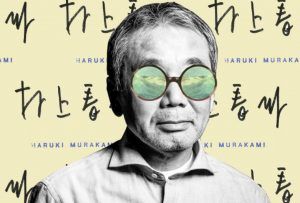 If you can believe it, Japanese novelist, talking cat enthusiast, and weird ear chronicler Haruki Murakami turned 70 years old this weekend. 70! But I suppose we should believe it, despite the youthful gaiety and creative magic of his prose: the internationally bestselling writer has 14 novels and a handful of short stories under his belt, and it’s safe to say he’s one of the most famous contemporary writers in the world. To celebrate his birthday, and as a gift to those of you who hope to be the kind of writer Murakami is when you turn 70, I’ve collected some of his best writing advice below.
If you can believe it, Japanese novelist, talking cat enthusiast, and weird ear chronicler Haruki Murakami turned 70 years old this weekend. 70! But I suppose we should believe it, despite the youthful gaiety and creative magic of his prose: the internationally bestselling writer has 14 novels and a handful of short stories under his belt, and it’s safe to say he’s one of the most famous contemporary writers in the world. To celebrate his birthday, and as a gift to those of you who hope to be the kind of writer Murakami is when you turn 70, I’ve collected some of his best writing advice below.
Read.
I think the first task for the aspiring novelist is to read tons of novels. Sorry to start with such a commonplace observation, but no training is more crucial. To write a novel, you must first understand at a physical level how one is put together . . . It is especially important to plow through as many novels as you can while you are still young. Everything you can get your hands on—great novels, not-so-great novels, crappy novels, it doesn’t matter (at all!) as long as you keep reading. Absorb as many stories as you physically can. Introduce yourself to lots of great writing. To lots of mediocre writing too. This is your most important task.
More here.
David Gunderman in The Conversation:

There are two things that connect the names Gauss, Riemann, Hilbert and Noether. One is their outstanding breadth of contributions to the field of mathematics. The other is that each was a professor at the same university in Göttingen, Germany.
Although relatively unknown today, Göttingen, a small German university town, was for a time one of the most productive centers of mathematics in history.
Göttingen’s rise to mathematical primacy occurred over generations, but its fall took less than a decade when its stars were pushed abroad by the advent of National Socialism, the ideology of the Nazi Party. The university’s best minds left Germany in the early 1930s, transferring its substantial mathematical legacy to Princeton, New York University, and other British and American universities. By 1943, 16 former Göttingen faculty members were in the U.S.
More here.
Gary Smith in Wired:
 Nobel laureate Richard Feynman once asked his Caltech students to calculate the probability that, if he walked outside the classroom, the first car in the parking lot would have a specific license plate, say 6ZNA74. Assuming every number and letter are equally likely and determined independently, the students estimated the probability to be less than 1 in 17 million. When the students finished their calculations, Feynman revealed that the correct probability was 1: He had seen this license plate on his way into class. Something extremely unlikely is not unlikely at all if it has already happened.
Nobel laureate Richard Feynman once asked his Caltech students to calculate the probability that, if he walked outside the classroom, the first car in the parking lot would have a specific license plate, say 6ZNA74. Assuming every number and letter are equally likely and determined independently, the students estimated the probability to be less than 1 in 17 million. When the students finished their calculations, Feynman revealed that the correct probability was 1: He had seen this license plate on his way into class. Something extremely unlikely is not unlikely at all if it has already happened.
The Feynman trap—ransacking data for patterns without any preconceived idea of what one is looking for—is the Achilles heel of studies based on data mining. Finding something unusual or surprising after it has already occurred is neither unusual nor surprising. Patterns are sure to be found, and are likely to be misleading, absurd, or worse.
More here.
Then after Eden,
was there one surprise?
O yes, the awe of Adam
at the first bead of sweat.
Thenceforth, all flesh
had to be sown with salt,
to feel the edge of seasons,
fear and harvest,
joy that was difficult,
but was, at least, his own.
The snake? It would not rust
on its forked tree.
The snake admired labor,
it would not leave him alone.
And both would watch the leaves
silver the alder,
oaks yellowing October,
everything turning money.
So when Adam was exiled
to our new Eden, in the ark’s gut,
the coined snake coiled there for good
fellowship also; that was willed.
Adam had an idea.
He and the snake would share
the loss of Eden for a profit.
So both made the New World. And it looked good.
by Derek Walcott
from Derek Walcott Collected Poems
Farrar, Straus, Giroux, 1986
Michelle Alexander in The New York Times:
 Bahia Amawi, an American speech pathologist of Palestinian descent, was recently terminated for refusing to sign a contract that contains an anti-boycott pledge stating that she does not, and will not, participate in boycotting the State of Israel. In November, Marc Lamont Hill was fired from CNN for giving a speech in support of Palestinian rights that was grossly misinterpreted as expressing support for violence. Canary Mission continues to pose a serious threat to student activists. And just over a week ago, the Birmingham Civil Rights Institute in Alabama, apparently under pressure mainly from segments of the Jewish community and others, rescinded an honor it bestowed upon the civil rights icon Angela Davis, who has been a vocal critic of Israel’s treatment of Palestinians and supports B.D.S.
Bahia Amawi, an American speech pathologist of Palestinian descent, was recently terminated for refusing to sign a contract that contains an anti-boycott pledge stating that she does not, and will not, participate in boycotting the State of Israel. In November, Marc Lamont Hill was fired from CNN for giving a speech in support of Palestinian rights that was grossly misinterpreted as expressing support for violence. Canary Mission continues to pose a serious threat to student activists. And just over a week ago, the Birmingham Civil Rights Institute in Alabama, apparently under pressure mainly from segments of the Jewish community and others, rescinded an honor it bestowed upon the civil rights icon Angela Davis, who has been a vocal critic of Israel’s treatment of Palestinians and supports B.D.S.
But that attack backfired. Within 48 hours, academics and activists had mobilized in response. The mayor of Birmingham, Randall Woodfin, as well as the Birmingham School Board and the City Council, expressed outrage at the institute’s decision. The council unanimously passed a resolution in Davis’ honor, and an alternative event is being organized to celebrate her decades-long commitment to liberation for all. I cannot say for certain that King would applaud Birmingham for its zealous defense of Angela Davis’s solidarity with Palestinian people. But I do. In this new year, I aim to speak with greater courage and conviction about injustices beyond our borders, particularly those that are funded by our government, and stand in solidarity with struggles for democracy and freedom. My conscience leaves me no other choice.
More here.
Leila McNeill in Smithsonian:
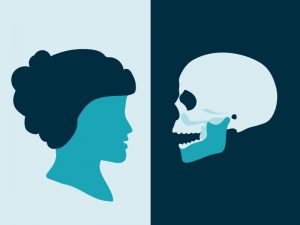 On the morning of June 10, 1898, Alice Lee marched into the all-male Anatomical Society meeting at Trinity College in Dublin and pulled out a measuring instrument. She then began to take stock of all 35 of the consenting society members’ heads. Lee ranked their skulls from largest to smallest to find that—lo and behold—some of the most well-regarded intellects in their field turned out to possess rather small, unremarkable skulls. This posed a problem, since these anatomists believed that cranial capacity determined intelligence. There were two possibilities: Either these men weren’t as smart as they thought they were, or the size of their skulls had nothing to do with their intelligence.
On the morning of June 10, 1898, Alice Lee marched into the all-male Anatomical Society meeting at Trinity College in Dublin and pulled out a measuring instrument. She then began to take stock of all 35 of the consenting society members’ heads. Lee ranked their skulls from largest to smallest to find that—lo and behold—some of the most well-regarded intellects in their field turned out to possess rather small, unremarkable skulls. This posed a problem, since these anatomists believed that cranial capacity determined intelligence. There were two possibilities: Either these men weren’t as smart as they thought they were, or the size of their skulls had nothing to do with their intelligence.
“In fact,” Lee would write in her thesis, “a number of the most capable men fall into the last nine, and J. Kollman, one of the ablest living anthropologists, has absolutely the smallest skull capacity!” Though only a doctoral student when she launched into her study of male and female intellectual difference, Lee’s study proved the most sophisticated criticism of cranium science to date, according to historian Cynthia Eagle Russet. Within a decade of publishing her findings in 1900, the field of craniology—and with it, the days of measuring skulls to interpret supposed biological human difference—would be no more. Ironically, Lee used craniologists’ own tools to cast doubt on the techniques they employed to argue their superiority to women, as well as to other races. In doing so, she waded into one of the most hotly debated social issues of her day: woman’s place in society.
More here.